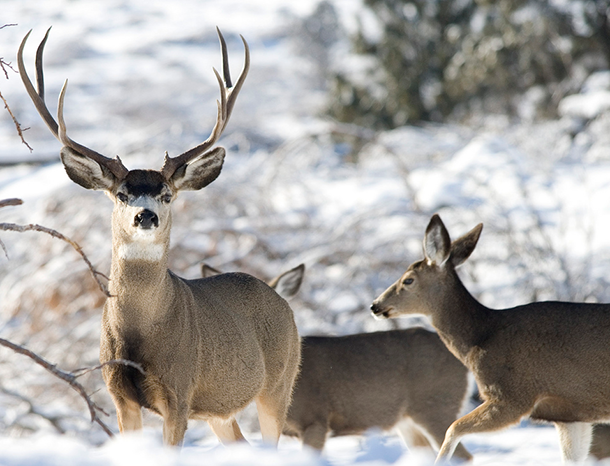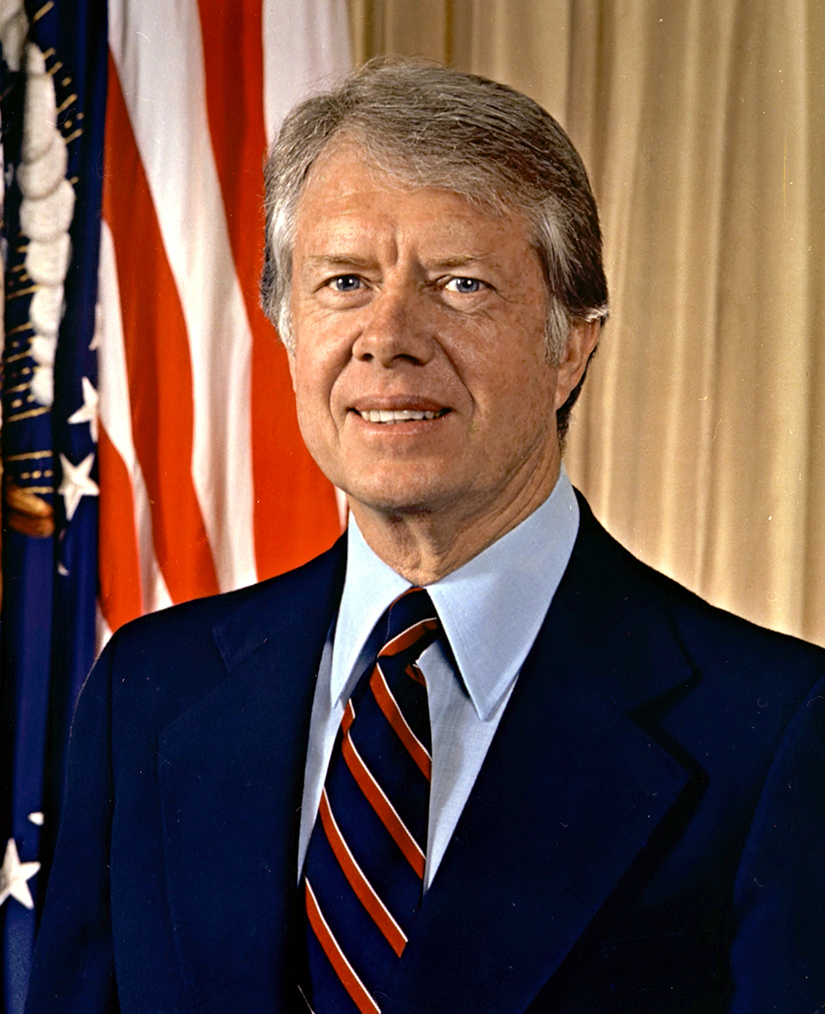Beyond the Headlines
Air Date: Week of July 18, 2014

Mule Deer numbers are on the decline in Colorado. (Photo: Oregon Department of Fish & Wildlife; Creative Commons Flickr 2.0)
In this week’s trip beyond the headlines, Peter Dykstra speaks with host Steve Curwood about the decline of mule deer in Colorado, New Jersey’s artificial phosphorus eating island, and recalls President Jimmy Carter’s “malaise” speech.
Transcript
CURWOOD: Off now to Conyers, Georgia. That’s where we find Peter Dykstra. He’s the publisher of DailyClimate.org and Environmental Health News, EHN.org, and he’s been mining the world beyond the headlines. Hi Peter, what did you find today?
DYKSTRA: Well, hi, Steve. You know in much of the U.S., for as far back as any of us can remember, there’s been concern that we have too many deer. The iconic White-tailed deer that thrive in the eastern half of the country in the “edge habitat” of the suburbs, and we’ve certainly expanded the suburbs for over the past 60 years or so.
CURWOOD: Oh, yeah, and by “edge habitat,” you mean that’s where the woods meet the cleared land along roads or fields, or subdivisions?
DYKSTRA: Right. But in the Western U.S., deer appear to be on the decline. A reporter named Bruce Finley of the Denver Post tells us that mule deer may have dropped by about a third in the past decade alone in the state of Colorado.
CURWOOD: So what’s the culprit?
DYKSTRA: There are multiple suspects. Extreme weather’s on the rise, disease, human development, oil and gas drilling, fire suppression tactics that make forests too dense to support deer, and other reasons, but here’s your irony of the week: Fewer deer might also mean less money for conservation, since conservation is funded sometimes by hunting license fees, and they’re also down. But let’s go on to something a little bit more positive than that.
CURWOOD: Oh yes please do! Positive is always welcome around here.
DYKSTRA: A little innovation from my ancestral home state of New Jersey, the Garden State. Jersey’s biggest lake is Lake Hopatcong, and they’ve had a little problem with phosphorus there. Phosphorus acts like a fertilizer in the lake, helping to grow algae and waterweeds, and those things deprive fish of oxygen and snag everything from swimmers to boat propellers.
CURWOOD: Wait a second, I thought you said this was going to be positive.
DYKSTRA: Well, I’m just getting to the positive part. The Newark Star Ledger reports that they’re dropping artificial wetland islands into Lake Hopatcong. And if they work, they’ll suck up some of the excess phosphorus, and they’ll keep the lake clean. This could be a big deal if it works because freshwater lakes all over the country are at risk from runoff, from leaky septic systems, and from warming temperatures. It might even help one of the greatest lakes of all, because they’re expecting another bad year for algae blooms in the western half of Lake Erie.
CURWOOD: Well, let’s move on now to the history calendar.
DYKSTRA: Steve, 35 years ago this past week, America heard what became known as the “malaise speech” from President Jimmy Carter.

Portrait of U.S. President Jimmy Carter (Photo: Wikimedia Commons)
CURWOOD: Oh yeah, in which he pretty much scolded the entire country, huh?
DYKSTRA: Yes, he talked to us like we were teenagers. But more to the point, the speech was mostly about energy and our dependency on oil imports. President Carter actually spoke a lot of truths to America that we’ve since spent more than a third of a century proving we didn’t want to hear. He said, “Energy will be the immediate test of our ability to unite this nation.” Two specific proposals from the speech were a dramatic ramp-up in solar energy, and an $88 billion dollar plan to make synthetic fuel from oil and natural gas.
CURWOOD: Well, that synfuels plan never happened, and solar has certainly taken its sweet time.
DYKSTRA: Yes, but bear in mind that Carter intended to inspire the country, not scold us all. Either way, the speech didn’t take. He got trounced by Ronald Reagan in the Presidential election a little over a year later, and one more thing about the “malaise” speech.
CURWOOD: What’s that?
DYKSTRA: Jimmy Carter never actually said the word “malaise;” that was just the word that stuck in the press coverage of his speech. But he did a pretty good job of predicting what would happen if we stay addicted to fossil fuels, and finally, we just learned that 2013 was the first year since 2007 where U.S. oil consumption rose, rather than fell. Back in the day, at least Jimmy Carter wasn’t facing opposition from members of Congress who view energy efficient light-bulbs as a sinister plot. So energy seems to be dividing us more these days, not uniting us.
CURWOOD: Hmm, more un-learned lessons. You can link to the speech where Jimmy Carter didn’t say “malaise” at LOE.org. Thanks Peter.
DYKSTRA: Thanks a lot Steve, talk to you soon.
CURWOOD: Peter Dykstra is the publisher of DailyClimate.org and Environmental Health News, that’s EHN.org.
Links
Read The Denver Post’s piece on Deer declining across Colorado and West
More about the Floating wetland islands installed at Lake Hopatcong in New Jersey
Significant Algae Bloom Predicted for Lake Erie This Summer
President Jimmy Carter’s energy warning and “malaise” (Crisis of Confidence) speech, revisited
Read the transcript of President Jimmy Carter’s Crisis of Confidence Speech
Living on Earth wants to hear from you!
Living on Earth
62 Calef Highway, Suite 212
Lee, NH 03861
Telephone: 617-287-4121
E-mail: comments@loe.org
Newsletter [Click here]
Donate to Living on Earth!
Living on Earth is an independent media program and relies entirely on contributions from listeners and institutions supporting public service. Please donate now to preserve an independent environmental voice.
NewsletterLiving on Earth offers a weekly delivery of the show's rundown to your mailbox. Sign up for our newsletter today!
 Sailors For The Sea: Be the change you want to sea.
Sailors For The Sea: Be the change you want to sea.
 The Grantham Foundation for the Protection of the Environment: Committed to protecting and improving the health of the global environment.
The Grantham Foundation for the Protection of the Environment: Committed to protecting and improving the health of the global environment.
 Contribute to Living on Earth and receive, as our gift to you, an archival print of one of Mark Seth Lender's extraordinary wildlife photographs. Follow the link to see Mark's current collection of photographs.
Contribute to Living on Earth and receive, as our gift to you, an archival print of one of Mark Seth Lender's extraordinary wildlife photographs. Follow the link to see Mark's current collection of photographs.
 Buy a signed copy of Mark Seth Lender's book Smeagull the Seagull & support Living on Earth
Buy a signed copy of Mark Seth Lender's book Smeagull the Seagull & support Living on Earth

